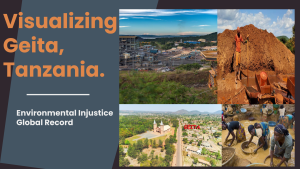Visualizing Geita
xxxx

xxxx

Funding for the ARC comes from donations, selling of health and safety products designed by the red cross, and the selling of blood products collected by the red cross.
This article addresses public health in that Haitians do not have access to the healthcare they need due to the current state of their government.
While, I can not find any specific events that have motivated their thinking about disaster and health, I believe this organization is motivated by the idea that people should be provided the health care they need despite their social or economic status.
I looked further into governmental relief policies after disasters, mental health policies in regard to emergencies, and New Orleans current state.
The film largely plays on emotional appeals and drama. By documenting the interviews of the doctors, which often are about the other doctors, the viewers see just how hard it is to detach ones self from their work. There is a scene in which the doctors talk about how, despite all the issues they face in the medical setting, everything at the end of the day is about personal relationships. It even briefly touches on sex between the medical staff and how that contributes to the care given. Since the film is based on personal interviews, little to no scientific information is given about the disease and injuries seen; its all based on personal opinion.
"Anna Pou, defended herself on national television, saying her role was to “help” patients “through their pain,” a position she maintains today"
"The laws also encourage prosecutors to await the findings of a medical panel before deciding whether to prosecute medical professionals. Pou has also been advising state and national medical organizations on disaster preparedness and legal reform; she has lectured on medicine and ethics at national conferences and addressed military medical trainees"
Miriam Ticktin received her PhD in Anthropology at Stanford University and the Ecole des Hautes Etudes en Sciences Sociales in Paris, France, and an MA in English Literature from Oxford as a Rhodes Scholar. Ticktin is now an Associate Professor of Anthropology and Co-Director of Zolberg Institute for Migration and Mobility.
Artisanal or Snall Scale Mining in Geita.